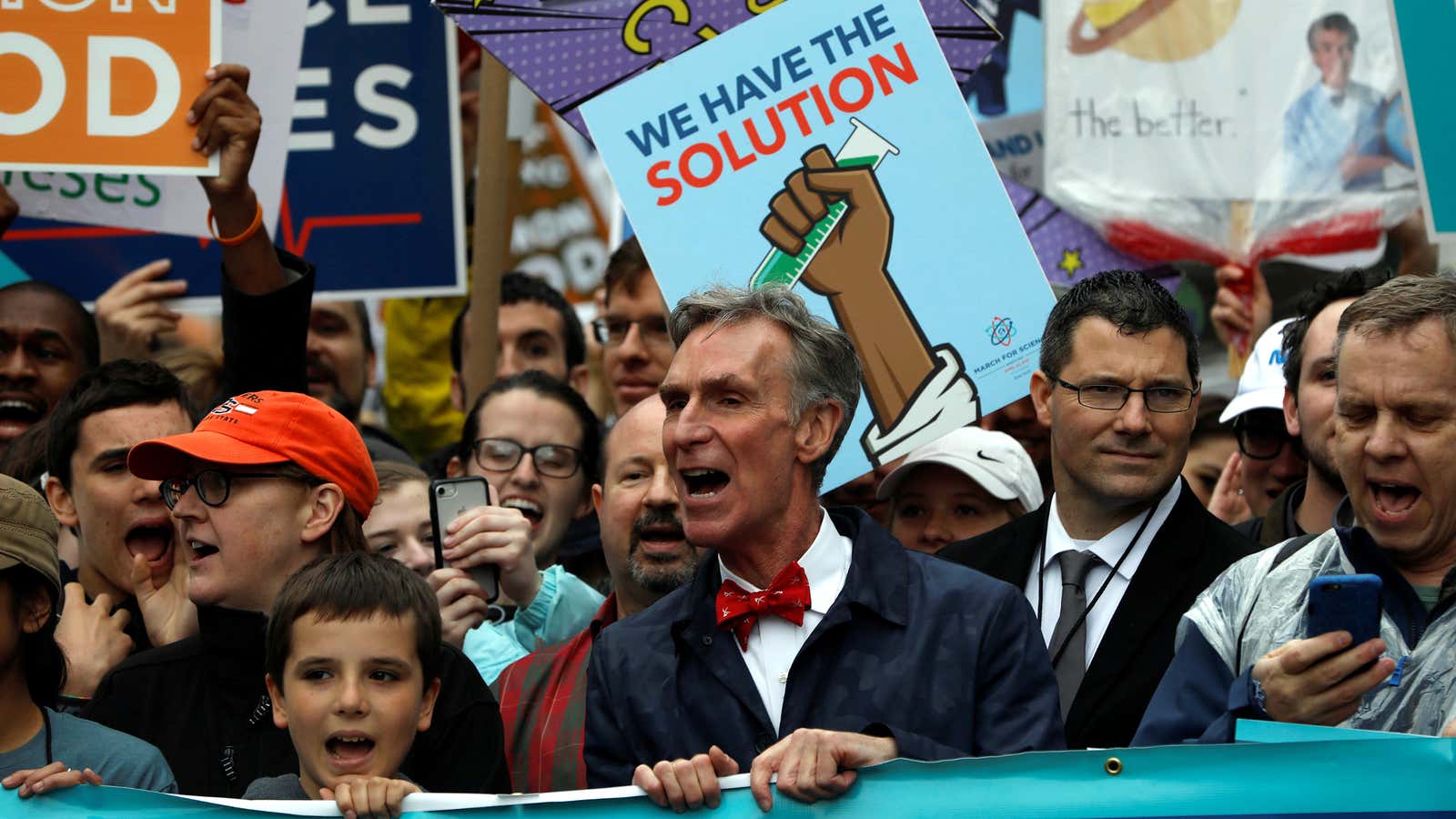When someone changes their mind, does it matter if the rationale is empirical, or expedient?
As a hard-right Oklahoma congressman since 2013, Jim Bridenstine has demanded that then-president Barack Obama apologize for funding research into how humans alter the climate. He misrepresented data collected by the EPA and NASA documenting the warming of the earth’s atmosphere over time. And he wrote a law that would have ended the space agency’s important role in earth science, collecting climate data with satellites.
Then Bridenstine was nominated to run NASA. On November 1, 2017, he showed up to his nomination hearing with a new message: “I believe that the scientific consensus is that humans are contributing and have contributed to the climate change that we have seen,” he told senators. He did not, however, embrace the idea that humanity is the primary culprit in climate change.
It was enough for Bill Nye the Science Guy.
Nye, a former Boeing engineer and TV host, is an outspoken critic of climate change deniers. He is also the CEO of the Planetary Society, an influential space exploration NGO founded by Carl Sagan to be advocate for NASA and space exploration. And next week, Nye will be Bridenstine’s guest at the State of the Union address.
The decision to publicly join Bridenstine is a tacit endorsement at a time when he faces significant criticism for his record and his experience. “During his recent nomination hearing, Congressman Bridenstine said that he now accepts climate change and that humans are playing a role in it,” Nye told Quartz in a statement. “He’s changed his mind, and in science that’s generally a good thing. I am hopeful that others will see the wisdom in the Congressman’s evolving view and follow suit. Let’s embrace the science and rise to the challenge of climate change.”
Other advocates for climate science are skeptical. ”[Bridenstine] did miss an important opportunity to confirm the scientific consensus on climate change, which we took note of,” Rachel Licker, a senior climate scientist at the Union of Concerned Scientists, told Quartz. “He did not confirm what we know to be true, that humans are the primary driver.”
More important to Licker, however, were several commitments the presumptive administrator made: He promised to continue NASA’s earth science research, to let that research agenda be guided by a decadal survey of scientists, and to guarantee that scientists at NASA will be free to express their opinions and share their research publicly. (Scientists at the EPA, led by climate change skeptic Scott Pruitt, were stopped from attending a conference last year.)
Licker says her organization sees Nye’s appearance with the controversial lawmaker as an opportunity to emphasize “the importance of keeping earth science research well-supported, and under the jurisdiction of NASA.”
The politics of science
It’s not clear that Bridenstine has won enough votes to be confirmed as NASA director by the senate. Many Democrats oppose his nomination due to his partisan history, and members of both parties have looked askance at his lack of experience as a manager, and his support for public-private partnerships in space exploration. A key problem is fellow Republican Marco Rubio, the Florida senator who is concerned about the space program in his state—and perhaps about jibes directed his way by Bridenstine during the last presidential election.
While NASA has been led by people without aerospace engineering experience in the past, those leaders had been experienced managers of large organizations without political baggage. The argument in favor of Bridenstine is that a politician would be best suited to managing the agency’s fraught relationship with its congressional task-masters. Yet Bridenstine’s political skills appear to have left him with the least support of any administrator in history.
That is why Nye’s support is so critical now: Bridenstine needs a non-partisan, scientific sheen for his brand. Bridenstine’s push for more reliance on private companies attracts space boosters like the Planetary Society, even as it rankles lawmakers who approach NASA as a job creation program more than an exploration agency. NASA, which has suffered from a stalled human spaceflight program, could use a shot in the arm, and if Bridenstine is not the nominee, his replacement is likely to be a much more conventional candidate tied to NASA’s bureaucracy or the aerospace industry.
“The congressman is the nominee to be the next Administrator of NASA, and as I often say, NASA is the best brand the United States has,” Nye said in his statement. “At the State of the Union address, I hope to hear the President present plans for an ambitious, science-driven space exploration agenda. Space exploration brings out the best in us. It brings the nation together as we solve problems that have never been solved before and learn more about the cosmos and our place within it.”
The potential to explore space has certainly brought out the best in Bridenstine, who says he will represent NASA with the same energy he brought to his Oklahoma congressional district. The question, if he is confirmed, will be whether his new commitment to climate science will be as ephemeral has his criticisms were.
